江苏省沭阳县潼阳中学高中英语Unit4Lawandorder教案8牛津译林版选修10
- 格式:doc
- 大小:96.00 KB
- 文档页数:3

Unit 4 Law and order科目: 英语主备人: 备课日期:课题Unit4 Law and order 第2课时计划上课日期教学目标1. Enable students to learn something about intellectual property.2. Help students better understand the meaning of long and complex sentences.教学重难点Make sure that students should grasp some important words and phr ases教学流程\内容\板书关键点拨加工润色Step1 GreetingsStep2 RevisionsStep3 Lead-inStep4 Teaching proceduresLanguage pointsPart IV (P roject)1. similarly「解析」 similarly 副词有以下两层意思:(1) 相似地; 类似地:The two boys dress similarly. 两个小男孩穿得差不多一样。
(2) 也; 同样:Sh e was late and I similarly was delayed. 她迟到了, 我也晚了。
similar 形容词“相像的,相仿的,类似的[(+to)]”如:His problem is similar to yours. 他的问题和你的相似。
similarity 名词(1)类似;相似[不可数]The similarity between the two reports suggests that one person wroteboth.那两个报告极其相似,这意味着它们出自一人的手笔。
(2)相似点;类似点[可数]Bees and wasps both sting, but they have other similarities too.蜜蜂和黄蜂都刺人,但它们还有其他相似之处。

Unit 4 Law and order科目: 英语主备人: 备课日期:课题Unit 4 Law and order 第10课时计划上课日期教学目标1. Enable students to learn something about intellectual property.2. H elp students better understand the meaning of long and complex sentences.教学重难点Make sure that students should grasp some important words and phrases教学流程\内容\板书关键点拨加工润色Step1 GreetingsStep2 RevisionsStep3 Lead-inStep4 Teaching proceduresLanguage points (task part)1. A person who is ashamed will be likely to speak very quietly andhesitantly in a flat tone of voice. (P58) 一个感到惭愧的人很可能说话声音轻轻地,语调平平,犹豫,likely: adj. 很可能的describes something that will probably happen or is expected:Do remind me because I'm likely to forget.What's the likely outcome of this whole business?I suppose that might happen but it's not very likely.[+ that] It's quite likely that we'll be in Spain this time next year. INFORMAL"Do you want to join me on a ten-mile run?" "Not likely (= certainlynot)!"NOTE: The opposite is unlikely.注意比较:likely, probable, possibleIt’s probable/possible/likely that…It’s probable/possible for somebody to do something.Somebody is likely to do something.不能说:Somebody is probable/possible to do something.It is likely for somebody to do something.2. I am writing to apologize for my recent behaviour. (P59) 我正在写信为我最近的行为道歉.apologize: verb道歉to tell someone that you are sorry for having done something that has caused them inconvenience or unhappiness:I must apologize to you for my being late.Trains may be subject to delay on the northern line - we apologize for any inconvenience caused.She apologized for having to leave at 3.30 p.m.apology noun [C or U]an act of saying sorry:I have an apology to make to you - I'm afraid I opened your letter by mistake. "Was he at all sorry for what he'd done?" "Oh he was full of apologies (= extremely sorry)."She complained to the company about its awful service and they sent her a written apology.apologize to somebody for something=make an apology to somebody for something:因为…向某人道歉3. I used to leave my bedroom lamp on to make them think I was studying. (P59) 我过去常常让我的卧室的灯亮着让他们以为我在学习.used to to som ething: 过去常常做某事be used to do something: 被用来做某事be used to (doing) something: 习惯于做某事He used to lie to his parents.This book can be used to help you study English.He is used to living in the countryside.注: would也可以表示过去习惯性的动作,意为: 总是; used to do something表示过去常做,而现在不做了.She would sit in fro nt of her house waitin g for her son’s return. There used to be a small river in front of her house. (But now there isn’t.)4. I know it is a lame excuse, but I thought I would be able to pay it back and did not think about it carefully. (P59) 我知道着是一个站不住脚的借口, 但我认为我将能够把它归还, 并没有仔细地考虑这件事.pay sb/sth back: phrasal verb 偿还to pay someone the money that you owe them:Can you lend me a fiver? I'll pay you/it back tomorrow.pay sb back phrasal verb 向…报复to do something unpleasant to someone because they have done something unpleasant to you:He swore he'd pay her back for all she'd done to him.pay的相关的常用短语:pay off: 有报偿; 还清(欠款等)All her hard work paid off in the end, and she finally passed the exam. We should be able to pay off the debt within two years.pay sb some money for sth.: 因为…向某人付钱I paid him 100 yuan for the old bike.pay for sth : 受到惩罚, 得到报应We all pay for our mistakes in some way at some time.。



Unit 4 Law and order科目: 英语主备人: 备课日期:课题Unit 4 Law and order 第7课时计划上课日期教学目标1. Enable students to learn something about intellectual property.2. Help students better understand the meaning of long and complex sentences.教学重难点Make sure that students should grasp some important words and phrases教学流程\内容\板书关键点拨加工润色Step1 GreetingsS tep2 RevisionsStep3 Lead-inStep4 Teaching proceduresLanguage pointsTest yourself:______ being fun and good exercise, swimming is a very useful skill.A. Except forB. Apart fromC. Or ratherD. in spite of答案: B介词besides,except,except for,but,apart from 和 in additionto 在用法上有何区别?besides 和 in addition to 同义,表示“除……之外(还)……”。
但是,当与nothing,nobody或no one等否定意义的不定代词连用时,besides与except同义,表示“除…之外(其余都不)”。
例如:She knows Japanese besides English.In addition to English, she knows Japanese.All of them went to climb the mountain except me.except 表示“除……外,(其余都)……”,常与“all,every,no,none,nothing”等含有整体肯定或否定意义的词连用。

Unit 4 Law and order科目: 英语主备人: 备课日期:课题Unit 4 Law and order 第13课时计划上课日期教学目标1. Enable students to learn something about intellectual property.2. Help students better understand the m eaning of long and complex sentences.教学重难点Make sure that students should grasp some impo rtant words and phrase s教学流程\内容\板书关键点拨加工润色Step1 GreetingsStep2 RevisionsStep3 Lead-inStep4 Teaching proceduresLanguage points1. apply: verb 适用; 应用 applied adj. [before noun] 应用的applied mathematics/science application n . 适用; 应用apply常用短语: apply to 适用于apply to / apply…to… / apply to…for…我们应该把这一理论应用于实践。
这种教学方法对我的学生并不适。
我向这家公司申请了一份工作。
I the company a job.2. face: verb 面对 be faced with 面临This country__________the prospect of war. 这个国家目前正面临战争。
此句可以改成:This country __________________ the prospect of war.相关短语:lose/save face (丢脸/保全面子) in (the) face of (面临…)to one’s face(直接地) make a face (做鬼脸)你面临着一个艰难的选择。
【关键字】英语Unit 4 Law and order科目: 英语主备人: 备课日期:课题Unit 4 Law and order 第3课时计划上课日期教学目标1. Enable students to lear n something about intellectual property.2. Help students better understand the meaning of long and complex sentences.教学重难点Make sure that students should grasp some important words and phrases教学流程\内容\板书关键点拨加工润色Step1 GreetingsStep2 RevisionsStep3 Lead-inStep4 Teaching proceduresLanguage pointsPart I (Reading)1.relate to「解析」 relate to = relate with(1)有关To what events did your remarks relate? 你的话指的是什么事?(2)使联系; 显示出...与...的关系(to , with) [及物动词]I can't relate what he does with [to] what he says. 我没法把他做的和说的联系起来。
(3)使有亲戚关系 [常用被动语态]They are re l ated to each other. 他们彼此之间有亲戚关系。
2. break into「解析」 brea k into 有以下四层意思:如:(1)强行进入某处:His house was broken into (e. g by burglars) last week. 上星期有人闯入他的房屋(如窃贼)。
(2)突然开始(大笑、唱歌、欢呼等):As the President's car arrived, the crowd broke into loud applause. 总统的汽车到达时, 群众中爆发出热烈的掌声。
Unit 4 Law and order科目: 英语主备人: 备课日期:课题Unit4 Law and order 第18课时计划上课日期教学目标1. Enable students to learn something about intellectual property.2. Help students better understand the meaning of long and complex sentences.教学重难点Make sure that students should grasp some important words and phrases教学流程\内容\板书关键点拨加工润色Step 1 BrainstormingAs is known to us all, crime is one of the most serious problems the worldis facing. Almost every country has to deal with this problem. With thepopularity of computer, more and more crimes involve the Internet. Theseare very hard to spot because they take place online. In order to keep orderand protect us from crime, laws are made.Do you know what ‘order’refers to? (It refers to the condition in which people obey l aws and rules.Speaking of crime, what can you think of? ( Types of crimes such as theft, murder, robbery, and also many people connected with it such as police,detectives, witnesses, judges, lawyers, victims, criminals, etc.)What other items can you think of?(Evidence, trial, in prison, arrest,etc.)Step 2 Sharing informationLook at the following pictures and discuss them.Picture1:What is the man trying to do with the hook? (He is trying to steal the ba gwhile the other person is sleeping.)How long ago did this happen? How do you know? (Judging from theirappearance, it might have happened hundreds of years ago.)Do you think this often happen nowadays? (This particular type of theft is less likely than in ancient times, although people still steal nowadays.) Picture2Have you ever heard about cybercrime? What do you know about it? Cybercrime has developed very recently.It involves the Internet, and it is hard to detect or track..It is not easy to catch the criminals involved in cybercrime because they could be in any country and can move quickly from place to place.It uses computer technology, and most criminals involved in it are experts in IT.International cooperation is needed to fight against it.Pictur e3Do you know anything about what the police do for society? (The police help to keep order and guard our society. They catch thieves, direct traffic and protect people.)What is your opinion about their work? Do you think our society would be safe without them? (They play an important role in protecting our society fr om crime and disorder. Without them, our society would be lawless.) Do you want to be a policeman or policewoman? Why or why notPicture4Some people copy artist’s music or lyrics without telling or paying them. They do this for either personal or commercial use. This is called ‘piracy’. What is your opinion about it?Have you ever seen pirate books, CDs or DVD s for sales?Do you think it is OK to pirate them? (No, it is illegal to copy them without permission. Other people’s works are their intellectual property, which should be protected by law. Otherwise, creators would be harmed, and they wo uld stop creating new works.)Step3: Discussion:1. Why do you think people break the law? What do you think of people who break the law? (People break the law for various reasons. Some do so to express hatred, or in the hope of getting more money or power. Some people are professional criminals. They do not know any other way of making money. Ma ny simply have no sense of law, so when they break a law, they even do not know this. People who break the law are sometimes worth our sympathy or care but more often than not they can’t be forgiven and should be seriousl y punished.)2. As a student, what do you think you can do to make our societysafer?(First, we ourselves should know about the law and keep the law.Second, we should educate other people to obey the law and try our best to fight against bad acts in our society and even stop crimes when necessary.)3. Have you ever happened to see or experience any crimes? What did you do then?。